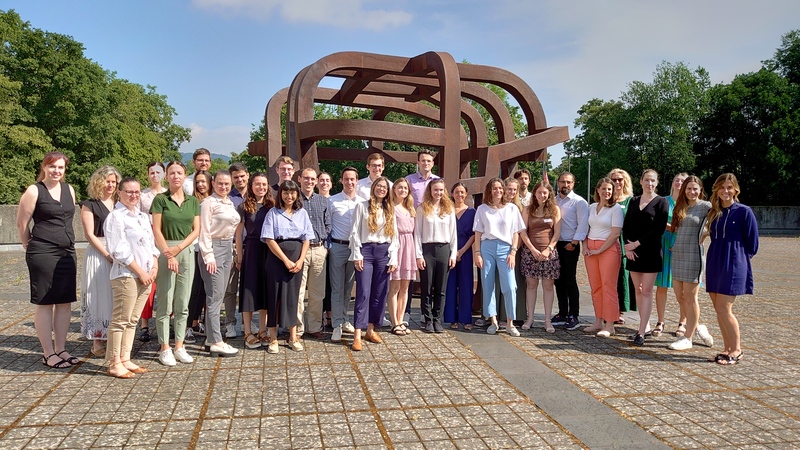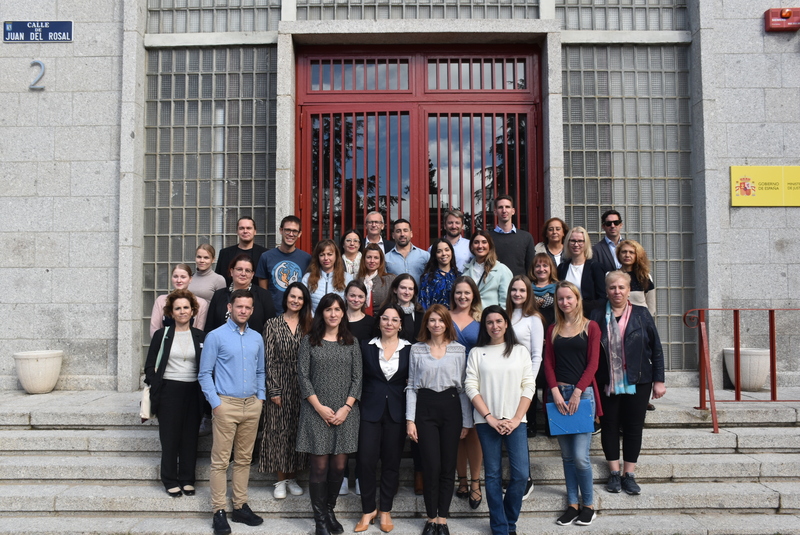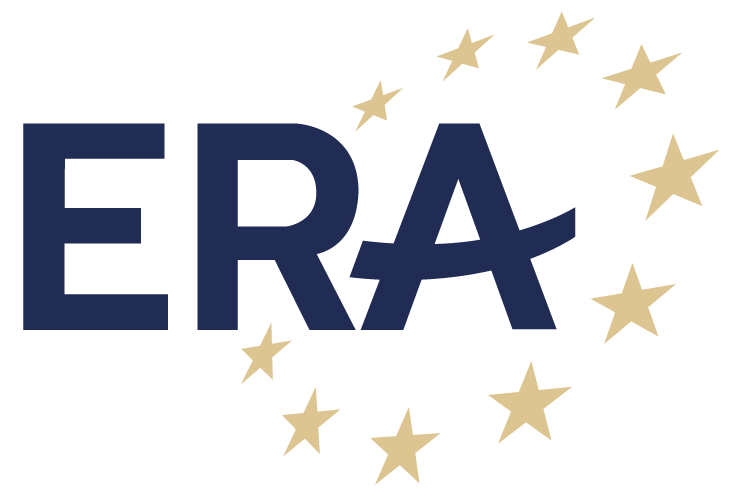Practical Training and Workshops

Training opportunities for young
professionals
In terms of practical training, ERA has considerably intensified its programme over recent years in order to better meet the needs of practitioners. In the first instance, this concerns a series of intensive one-week summer courses aimed at young professionals and non-specialists. The utmost effort is made to ensure these courses are always top-quality; they are all designed to be interactive, including case studies, practical workshops, and role-playing to allow participants to put immediately into practice the knowledge they acquire.
The Young European Lawyers Contest (YELC) is one of the core elements of ERA’s current strategy to train lawyers at the start of their career. Organised since 2018 in cooperation with CCBE, the aim of the Young European Lawyers Contest, currently financed under the EU Justice Programme 2021-2027, is to bring together newly qualified lawyers from European countries to highlight the importance of European law for their future legal practice and to put their legal skills to the test in a dynamic environment. Supported by Bars and law schools from 19 different EU Member States, the 2023 contest was composed of 3 semi-finals hosted in the first semester by the Dutch Section of the Brussels Bar, the Lithuanian Bar Association and the Paris Bar respectively. During the semi-finals, the 48 candidates from 15 different countries were assigned to teams of four. Before each semi-final, each team needed to complete a written report on a question of EU law and present it orally during the semi-final to a panel of jurors composed of experienced and skilled litigators. The two winning teams of these semi-finals qualified for the final organised in Trier in October 2023 during which the teams participated in a half-day training on litigation before performing a negotiation exercise. The highlight of the final was a moot court session before the General Court of the European Union in Luxembourg, where the two best teams represented two disputing parties – a private company as the applicant and the European Commission as the defendant – in an action for annulment aimed at the Commission’s decision authorising State aid in favour of a competitor of the applicant. After the moot court, a short awards ceremony took place, including prizes for the winning teams and for the best individual contestant in the final. The first-placed team was composed of lawyers from Ireland (the Bar of Ireland), Belgium (Balie Brussel), Austria and Spain (ICAB). The second-placed team was composed of lawyers from Germany, France (Bar of Versailles), Slovakia (Slovakian Bar Association) and Poland.
The Young European Lawyers Academy (YELA) is a co-funded project designed to complement the Young European Lawyers Contest, whereby its main objective is to raise awareness of cross-cutting areas of EU law. The goal is to enable young lawyers in private practice to contribute to the effective and coherent application of EU law across Europe. Therefore, the seminar programme focuses on questions of the rule of law, fundamental rights, EU litigation and data protection among others. The intensive course was organised twice in 2023 in cooperation with the European Young Bar Association (EYBA) and several national and regional bar associations. During the ten days, participants received intensive training in Trier and visited the Court of Justice of the EU in Luxembourg and the European Court of Human Rights and the European Parliament in Strasbourg. ERA hosted 60 young lawyers in 2023 from Czechia, France, Germany, Hungary, Romania, Slovakia, Slovenia and Spain.
Large-scale training projects
designed for judges and court staff
Among the most prominent examples of large-scale training projects in the ERA annual programme are the two long-running series on EU Anti-discrimination Law and EU Gender Equality Law. These projects, bringing together some 600 judges, legal practitioners and academics from all EU Member States each year, are implemented on behalf of and in cooperation with the European Commission, currently under the Citizens, Equality, Rights and Values (CERV) programme. Twelve seminars were implemented in 2023, nine of which were held outside of Trier.
In 2021, ERA was awarded – for the third time in a row – a four-year service contract to continue a major project on behalf of the European Commission’s DG Environment entitled "Cooperation with National Judges in the Field of EU Environmental Law". The initiative aims to develop training modules on various topics of EU environmental law as well as to organise workshops for judges. In 2023, ERA implemented ten events in the framework of these specific contracts: two general webinars on EU water legislation, one in French and one in German; two tailor-made webinars on EU water legislation in the respective national languages, one for Spain and one for Poland; one general webinar on EU waste legislation and combating waste crime, in English; two workshops on EU waste legislation and combating waste crime, in English, held in Lisbon and in Sofia; two tailor-made workshops on EU and national waste legislation and combating waste crime in the respective national languages, one for Romania and one for Greece; and one tailor-made workshop on access to justice in environmental matters for Polish judges, in Polish.
In January 2023, ERA started a new training project for court staff and bailiffs in partnership with the European Judicial Training Network (EJTN), the Belgian Judicial Training Institute (IGO-IFJ), the Bulgarian National Institute of Justice (NIJ), the Romanian National School of Clerks (NSC) and with the support of 13 national judicial training institutions and the European Union of Judicial Officers (UEHJ). Building on the knowledge and experience gained from the implementation of previous court staff training projects, the project consortium led by ERA tackled the deficiencies of court staff and bailiffs’ training by adopting a modern and practical approach to EU judicial training and by developing coherent and innovative training packages for future use. The activities dealt with EU civil and criminal law matters as well as digitalisation. To better accommodate the various training needs of the target groups, reflecting different levels of prior knowledge and experience in applying EU instruments, the legal seminars were offered at both basic and advanced level. Some activities offered legal English language training parallel to legal training thus enhancing the linguistic skills of court staff and bailiffs in legal areas with added practical value. The events were offered in face-to-face, hybrid and online formats. The project also delivered on its promise to create new materials, namely an interactive and stand-alone e-tool for legal English in criminal law matters with the aim of improving the level of English in this field of law. In the first year of the project lifetime 213 court staff and bailiffs have already benefited from this project that will run until 2025.
In 2023, ERA started the second edition of an advanced training project for court coordinators in European law with the support of EJTN and the judicial training institutes of Bulgaria, Hungary, Italy, the Netherlands, Poland, Romania and Spain. The project focuses on areas with particular relevance for these senior judges with advanced knowledge of EU law, namely the application of EU law, the preliminary ruling procedure and fundamental rights (including the rule of law). Within the project, ERA intends to train 235 court coordinators and 30 judicial trainers from the EU Member States. They will receive advanced practical training and enhance their knowledge and competence in the application of EU law. Moreover, as they act as multipliers in their jurisdictions, they will be able to pass on the knowledge acquired. Another aim of this project is to provide a platform for the exchange of information, knowledge and best practice; create close contacts among court coordinators from the Member States that have active networks; and encourage other judiciaries to create such a network.

Advanced cross-professional training projects
The project entitled “Mediation in the EU: Language, Law and Practice” aimed to spread knowledge about cross-border mediation, encourage its use among judges, lawyers and mediators, and develop their legal and professional English language skills. With the support of ten national judicial training institutions, six bar associations, and three EU-wide mediation and judicial networks, a series of nine language training activities on cross-border mediation was organised throughout Europe from November 2021 to April 2023. The project offered a two-fold dimension to training: participants received both language training at intermediate level and practice-oriented mediation training. The training events were attended by judges, lawyers and mediators from various Member States, offering cross-professional training and ensuring the exchange of experiences, advice and best practices in mediation. Each event dealt with either civil and commercial mediation or family mediation. In the first half of 2023, the last three seminars were held in Bulgaria, Greece and Lithuania. The project ended in September 2023, having trained 223 judges, lawyers and mediators from all over Europe.
In April, May and September 2023, ERA implemented three events of another large-scale project sponsored by the European Commission entitled “Preparing Criminal Justice Professionals to Address New (Post-)Pandemic Challenges as a Result of Criminals’ New Modi Operandi”. The project consists of seven seminars out of which three took place in 2023 in Dublin, Lisbon and Cracow; these addressed various challenges that judges, prosecutors and lawyers in private practice working in the field of EU criminal justice will have to face in the years ahead. Some of these challenges (videoconferencing, widespread use of open-source intelligence, digital technology etc.) are there to stay as the new normal.
In 2023, ERA implemented the final two seminars of six events of a large-scale project co-financed by the European Commission, entitled “Countering Trafficking in Human Beings (THB): Practice-Oriented Training on Measures to Enhance Investigations and Prosecutions, Disrupt the Financial Business Model, and Intensify Preventive Measures”. The fifth seminar in Sofia in March covered the topic of financial investigations of THB and focused on disrupting the financial business model of THB, following the money, and untangling the business chain, while the sixth seminar in Krakow analysed the scope of the problem of demand for THB and how it can be countered with prevention initiatives to reduce demand.

Tailor-made training courses
Besides its cooperation with national bars, ERA frequently works with associations or networks of individual lawyers or law firms. In 2023, it organised its eleventh annual joint seminar in Brussels with the European Employment Lawyers Association (EELA), which was attended by 77 lawyers in private practice from 23 different countries. The event provided participants with the opportunity to discuss current topics of European labour law and an update on the most recent CJEU cases in this area.
As a continuation of its partnership with the Global Electronic Council that started in 2019, ERA organised two online training events in 2023 at their request, on sustainability and EU public procurement law. The events were aimed at providing an introduction to European public procurement law and how it can be leveraged to achieve sustainability objectives. They were attended by a total of 139 procurement professionals (representatives of contracting authorities and the private sector) from EU and non-EU countries.
In October 2023, ERA designed and implemented an intensive course on “Sustainable and Digital Finance” for the EFTA Surveillance Authority (ESA). The programme covered topics on financial services in general, particularly in the area of enforcement and horizontal vision in the work of the European Commission, as well as a range of topics on sustainable and digital finance. Special attention was paid to green bonds, MiCAR, DORA and the AI Act.



